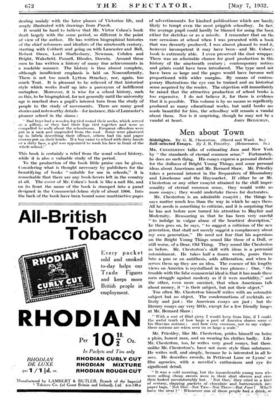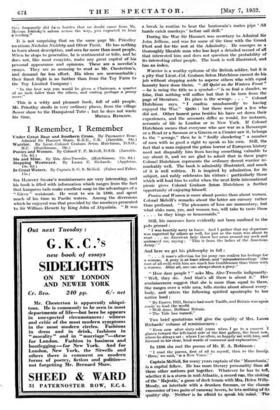Men about Town
MR. CHESTERTON talks of estimating Jazz and New York by " the standards of eternal contnain sense." Fortunately, he does no such thing. " His essays express a personal distaSte for the dullness of Bright Young Things, and some personal ideas about AmericanS and Mr. Bernard Shaw. Mr. Priestley takes a personal interest in the frequenters of Bloomsbury and Limehouse and the Hay-market. If either he or Mr. Chesterton or any' other essayist attained to the chill imper- sonality of eternal common sense, they would write no more essays ; they would undertake theses for doctorates.
Mr. Chesterton is an admirable essayist ; the things he says matter much less than the way in which he says them. All he needs is something to criticize, and it is surprising that he has not before now turned his attention. to Mayfair and Modernity. Reassuring us that he has been very careful " to indulge in vulgar abuse of the heartiest description," be then goes on, he says, " to suggest a criticism of the new generation, that shall not merely suggest a complacency about my own generation:" He need not far that his aspersions on the Bright Young Things sound like those of a Dull, or still worse, of a Dear, Old Thing. They sound like Chesterton as before. Mr. Chesterton's skill with ideas is a perennial astonishment. He takes half a dozen words, pours them into a pun or an antithesis, adds alliteration, and when he serves them up they are an idea. The essence of his lengthy views on America is crystallised in two phrases : One, " the trouble with the false comthercialideal is that it has made these men struggle against. modesty RS if it were morbidity," and the other, even more . succinct, that when Americans talk about money, it " is their subject, but not their object."
Too often Mr. Chesterton himself writes with an ostensible subject but no object. The condemnations of cocktails are lively and just : the American essays are just : but the literary essays say very little, except for a few friendly lunges at Mr. Bernard Shaw : " With a sort of filial piety I would keep from him, if I °mild. the awful truth of how large a part of America shares some of his Shavian notions ; and how very common, not to say vulgar. these notions are when seen on so large a scale."
Mr. Priestley., like Mr. Chesterton, prides himself on being a plain, honest man, and on wearing his clothes badly. Like Mr. Chesterton, too, he writes very good- essays, but theie. unlike Mr. Chesterton's, have not more style than substance. He writes well, and simply, because he is interested in all he sees. He describes crowds, in Petticoat Lane or Lyons' or filth agencies, With a novelist's enthusiasm and eye for
significant detail. •
"'It Was a cold morning,- bin the innumberable young men who were selling cheap sweets were in their shirt sleeves and e'riOn then looked uncomfortably hot. Not Gild,' they cried in a kind of ecstasy, slapping ,packets .qf chocolate. and:- butterscotch Mto paper bags, ' Not One—Not Two—Not Three--Rut Foist I Who'll -have the heist - Whenever:one of these people-had a drinky as
they frequently did fis m bottles that no doubt came from Mr. Hyman Isbitskfa saloon across the way, you expected to hear Wsirding."
It is not surprising that on the same page Mr. Priestley mentions Nicholas Nickleby and Oliver Twist. He has nothing to Team about description, and sees far more than most people. When he stops to generalize, he is sentimental or trite, and he does not, like most essayists, make any great capital of his personal appearance and opinions. These are a novelist's essays. They are as amusing to read as Mr. Chesterton's, and demand far less -effort. His ideas arc unremarkable ; their finest flight is no further than from the Toy Farm to the Toy Limited Company :
In the best sets you would be given a Chairman, a quarter of au inch taller than the others, and costing perhaps a penny snore."
. This is a witty and pleasant book, full of odd people. Mr. Priestley strolls in very ordinary places, from the village flower show to the Hampstead Tube : but he does not waste







































 Previous page
Previous page